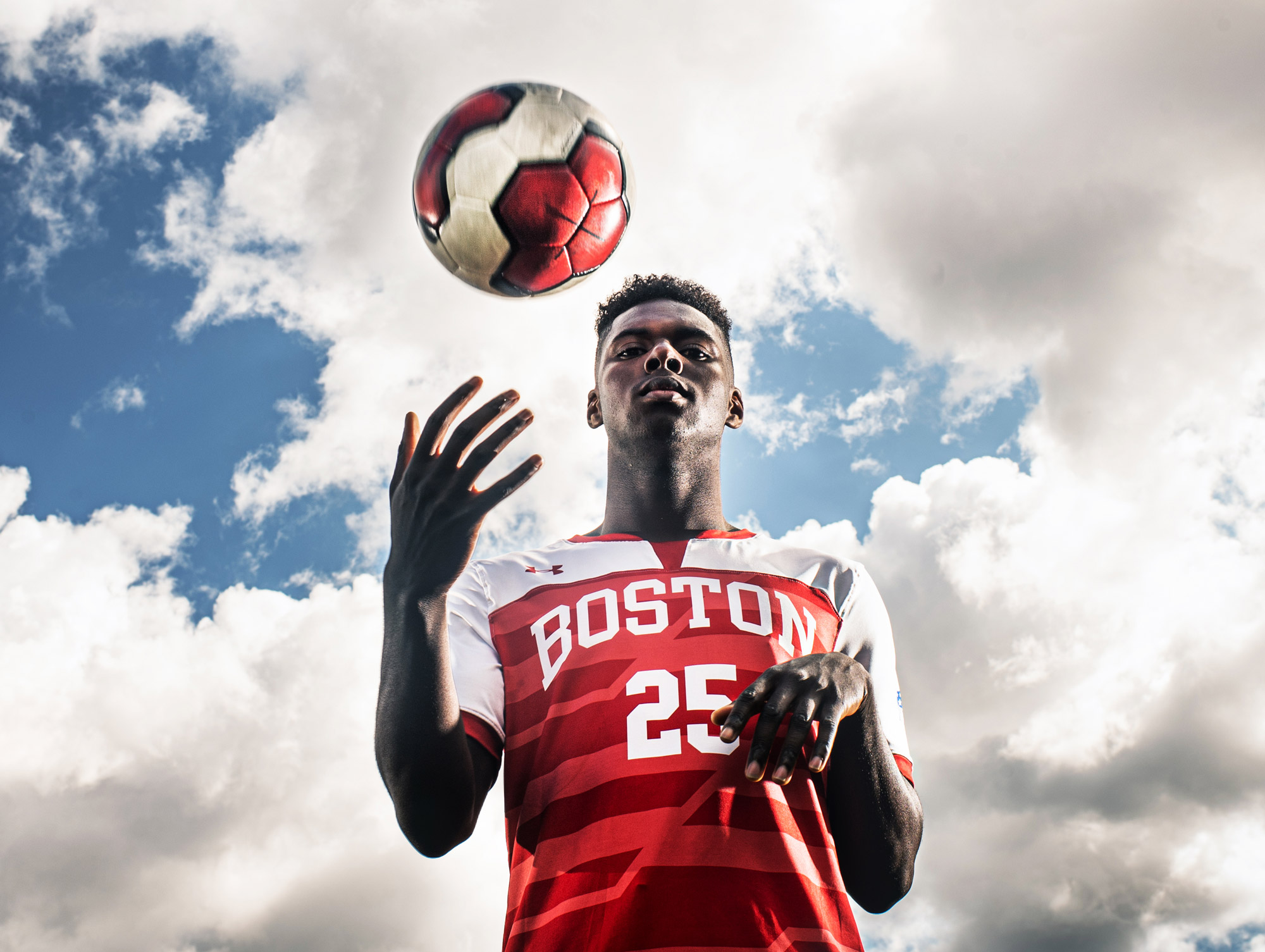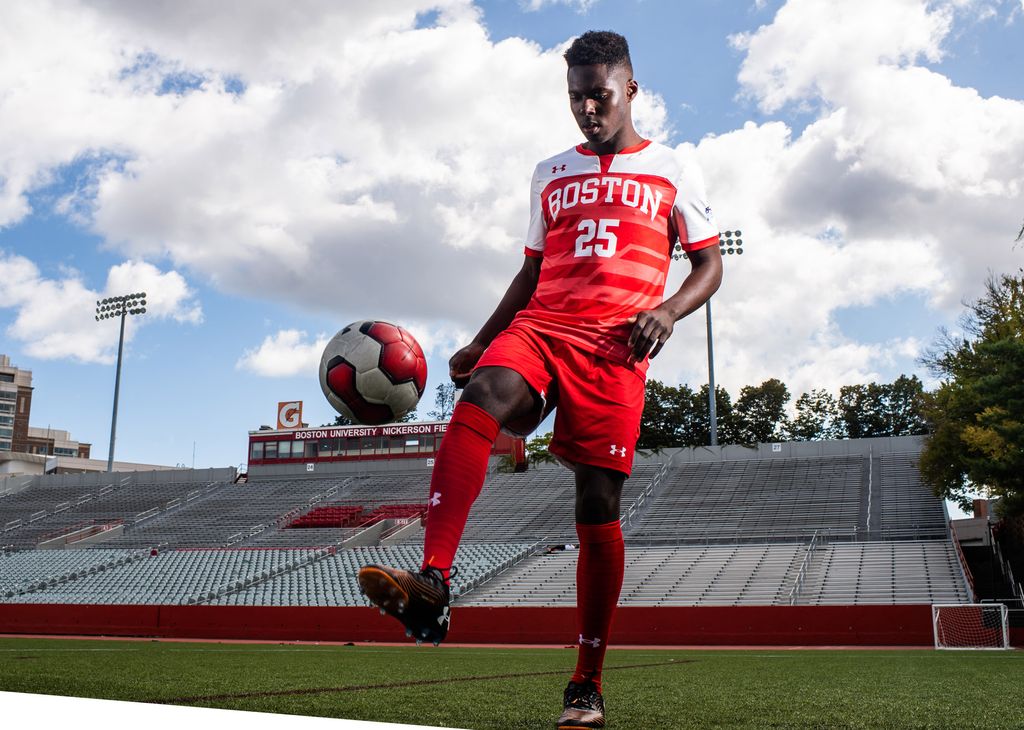COM Junior George Abunaw, Cut from Club Soccer, Is Now Thriving with Varsity Team

Walk-on COM Junior George Abunaw Is Thriving on Varsity Team
George Abunaw’s memories from his college soccer debut are a bit foggy. For good reason. He wasn’t supposed to be there.
In the fifth game of the BU men’s soccer team’s 2018 season, Matt McDonnell (Questrom’20), one of the nation’s leading scorers at the time, scored a goal—but he also went down with a season-ending injury.
Head coach Neil Roberts called on walk-on Abunaw (COM’21) to replace the team’s fallen superstar on offense. In a sense, Abunaw did. Although there are no goals on his statistics page, his first college shot deflected off the back of a defender and into the net. Tallied as an own goal (a goal scored inadvertently by a player on the defensive team), Abunaw remembers the postgame proceedings vividly.
“They had one of the scoresheets,” he says, “and Neil came up to me, he took a pen, he scribbled off ‘own goal,’ wrote my name, and said, ‘Give this to your mom.’”
The game-tying goal helped the Terriers avoid a loss. Although Abunaw doesn’t quite consider it a true first goal, he says, “I count it as a goal contribution, but it doesn’t say I scored anywhere, which is kind of upsetting.”
As a sophomore, Abunaw started in 7 of his 13 appearances last fall, his first year with the team. A bevy of injuries and his own strong push earned the 6-foot-2, 180-pound back a spot in the rotation early in the season, and he has yet to relinquish it.
Journalism is “the reason I came here,” Abunaw says. “I could have gone to other schools, but I came here because of COM, so it would be a waste if I didn’t take advantage of the opportunities that are given to me.”
“So many guys were out all season, it really gave him an opportunity to play,” Roberts says. “He could get settled in. He gave us a lot of energy.”
Unlike his older brother David, who played soccer at Bryant and Connecticut, Abunaw enrolled at a Division 1 school unsure of a future in collegiate soccer. Coming out of University High School of Science and Engineering in Hartford, Conn., he had considered playing soccer at some smaller schools, including Lafayette, Davidson, and Williams.
He came to a jarring realization when he visited Williams as a high school senior. “I just didn’t like it at all,” he says. “I thought about the other schools—yes, these schools want me for soccer, but academically they didn’t have a journalism program, and that’s what I came in wanting to do.”
He took to the internet to research the country’s top journalism schools, focused less on the opportunity to play college soccer. BU was near the top of the list, plus it was relatively close to his home in West Hartford.
“From that day on, I was like, ‘I should try and go here,’” Abunaw says.
Cut from club, made varsity
Abunaw, now a junior, emailed BU associate head coach Scott Black about a walk-on position, and although Black took a look at him at a showcase that fall, he felt there were already enough players on the team.
Roberts had heard from one of Abunaw’s coaches and knew he was coming in. “We always look out for kids,” Roberts says, “and hopefully we can pick one up here or there because it brings a different energy.”
Abunaw was promised a tryout for the varsity team, but went for a spot on BU’s club team as well. Over 100 kids tried out and he made the first cut—but that’s it. He’s still not sure why. He didn’t let it discourage him, and he began training on his own to get ready for his walk-on opportunity in the spring.
“I just laughed it off, honestly,” Abunaw says. “My focus was on the spring anyway because I knew if I didn’t come in sharp for that, immediately they could be like, ‘I don’t care what we said in the past, you’re not where we thought you were going to be.’”
Abunaw had his tryout in late February. First he was offered a week, then extended to two. When he returned from spring break, he had three trial days left. And that was it. There was no ceremonial moment of making the team—he simply worked his way onto the roster.

“We’ve seen a couple guys come in here, and most of them haven’t made it,” says Jasper Verplancke (Questrom’20). “He worked really hard.”
Over Roberts’ 35-year tenure, he has taken fewer than one player a year that way, and over the last few years opportunities have been less and less.
Once the fall season began, Abunaw set his sights on making the game roster, and with strong performances in practices and preseason tilts, he succeeded in what felt like a major achievement. “I wasn’t really expecting to play at all,” he says. But his versatility led to a spot in the rotation. He’d never played a specific position in high school, and his ability to play all over the field made him a worthwhile addition.
“As long as you work hard and you focus, everyone starts at the same level,” says Elias Lampis (CAS’21). “If you can prove yourself in practice, then you get a shot.”
When McDonnell went down in that fifth game, Abunaw subbed in as forward, a position he hadn’t played in a game since ninth grade. A few minutes later, he contributed to the tying goal. From there, he worked into a full-time player and often started. He’s played striker, center midfielder, and center back, often rotating between multiple positions in a game. His ability to pull the team together is a plus, too.
“He’s amazing,” Verplancke says. “He makes sure everyone is happy. He’s the one on the team who is friends with everyone.”
Pursuing his sport in the booth and on the pitch
Abunaw enrolled at BU with aspirations of becoming a broadcast journalist. Now majoring in public relations, he’s involved with various television shows on BUTV10, and is also a color commentator for women’s soccer games on the Patriot League Network on Stadium.
“That’s the reason I came here,” Abunaw says. “I could have gone to other schools, but I came here because of COM, so it would be a waste if I didn’t take advantage of the opportunities that are given to me.”
His insight and analysis complements the play-by-play broadcaster well.
“I’ve always worked with students before, and even student-athletes, but to do soccer with a soccer student-athlete was cool,” says Scott Sudikoff, one of the play-by-play broadcasters. “He obviously knows how to talk and analyze the game, but he also knew the players on the women’s team personally, so that added a different layer. Plus, just him being involved with the productions, he already understands what is expected of the broadcast team.”
“It’s rare to work with a color analyst who boasts so much current firsthand knowledge of a college sport,” says Kevin Gehl, another broadcaster. “When George jumped from the field to the booth for our Patriot League Soccer Championship coverage last fall, he provided expertise on the league that added depth to our broadcast.”
Abunaw also works on the production of games. His goal is to work in the public relations department of a sports team, but he still enjoys doing the broadcasts. “I’m going to be going to the games anyway, so it’s kind of nice to take an active role in it,” he says. “When you’re watching a game, it’s natural to commentate, natural to talk about what you see, so to be able to do that in front of hundreds and sometimes thousands of people is pretty exciting.”

Comments & Discussion
Boston University moderates comments to facilitate an informed, substantive, civil conversation. Abusive, profane, self-promotional, misleading, incoherent or off-topic comments will be rejected. Moderators are staffed during regular business hours (EST) and can only accept comments written in English. Statistics or facts must include a citation or a link to the citation.